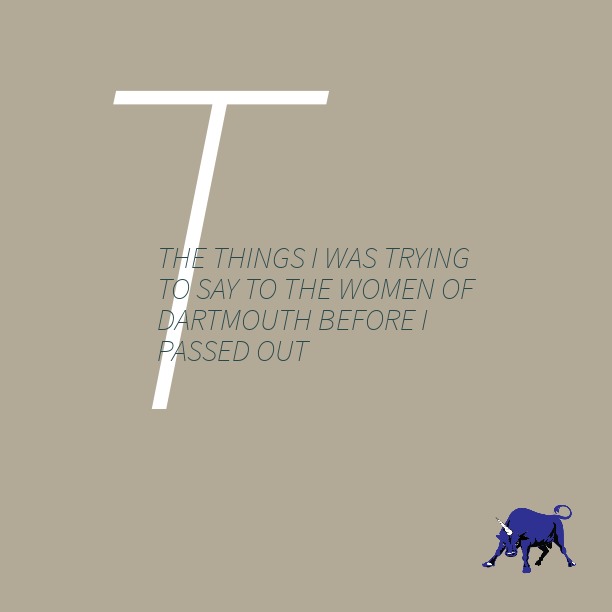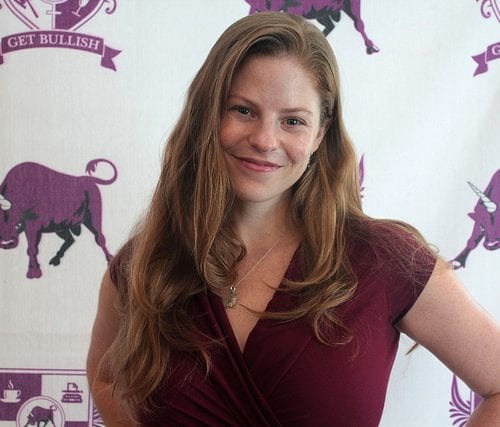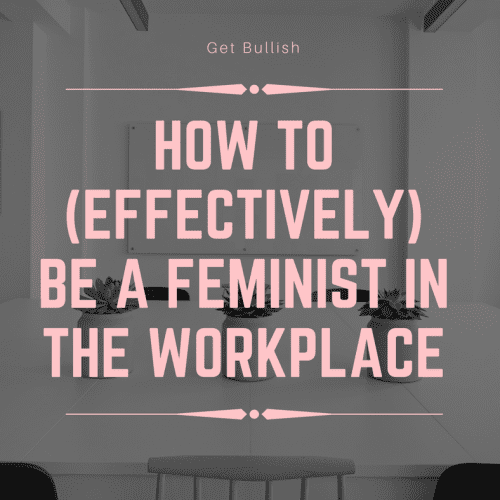This past Monday, I was the keynote speaker at Dartmouth College’s Words of Wisdom event for first-year women.
This is a thing I do. I give speeches. I have spoken at other universities, performed standup comedy for the U.S. troops in the Middle East (for audiences of 800 armed men sitting at picnic tables in the middle of the Kuwaiti desert!), and even taught public speaking to convicts in a Vermont prison.
I have read the statistics that most people are more afraid of public speaking than of death, and I’ve always been a bit smug about it. Public speaking is no big deal!
(See Bullish Life: What I Learned From Being Captain Of My College Debate and Boxing Teams.)
This dovetails nicely with a particular piece of career advice I often give: Master some rare and difficult skill that most people fear. Do not just do the thing you love. Most people’s dreams, in fact, are a bit too fun and common. (See Bullish Life: Some Dreams Are Stupid.) People like a lot of the same things (fashion, for instance). So, a good way to make a living or start a business is to find a way to mix the thing you love with something other people find difficult or frightening. You love yoga? Find a way to use yoga to help kids with autism or to help executives make more money in the stock market.
So, public speaking is usually pretty easy for me. But this time, I was a bit nervous. I was at my alma mater, where I was to speak for 45 minutes and then do Q&A for 15, and no one needs 45 minutes of platitudes (Follow your dreams! You can do it! The friends you make here will be your friends for life! Barf.) So, a good part of my speech was about class, which I talk about a lot – for instance, in Bullish: Social Class in the Office.
Oh, and it was a dinner event, so I didn’t eat dinner beforehand. And before that, I was in the car, on the way to Hanover, NH, and before that, there was a hotel breakfast buffet. So, I didn’t have lunch, either. I did stop somewhere and get a bowl of soup, but it was like five spoonfuls of pureed corn and heavy cream. So, I just had that. And then I got dressed in a magenta pleated dress from BCBG Max Azria, an amazing black and gold cage belt, and a cream-colored linen blazer. I was really happy with the outfit. This outfit is kind of like the gun that appears in an establishing shot at the beginning of a murder mystery.
The Part Where You Open With a Funny Story
I did that! Here:
I was the first person in my family to go to college, and I didn’t know how anything worked. I was the debate champion of Virginia (in 1995 and 1996!), so I thought I was probably headed someplace good, but I admit, I applied to Dartmouth because it was an Ivy League school and it was far away from my parents. My family couldn’t afford to visit colleges before I applied, or maybe my family just didn’t realize that was a thing, so when I got in, which was pretty exciting, I pulled out a map and I looked for New Hampshire. It wasn’t where I thought it would be, which was somewhere about Pennsylvania. I kept looking and finally located New Hampshire just south of Canada, and which point I realized I might need to buy a winter coat.
About two months into my freshman year, I called my mom and said, “SEND ME ALL THE SWEATERS YOU HAVE.” She mailed me a box with the sweaters she and my father had worn in high school in the seventies, as well as sweaters my younger (but much larger) brother had grown out of. I wore these sweaters two and three at a time – a tank top and then long underwear and then mom’s sweater and then dad’s sweater and then finally my brother’s mega-sweater. And then I would get into the building where class was actually being held and immediately begin to overheat, at which point I would grab an extra chair and pile it up with my coat, hat, scarf, my brother’s sweater, dad’s sweater, mom’s sweater, and my very sexy long underwear shirt, and I’d sit there in class in a black tank top, finally comfortable.
I’ve noticed that people who’ve grown up in New England – or, say, Norway – have this all worked out. They wear a shirt, a sweater, and a coat, and then they get to class and take off the coat and they’re fine. I don’t get it. I’m very sensitive to temperature. My first year here, I fantasized about transferring to Hawaii. Not the university of Hawaii. Just … to Hawaii.
The Part Where I Give Practical Advice for Students
If you’ve read other Bullish columns, you know that I give career advice, and that I’m really big on engaging with the real world – and taking risks, and doing hard things – as early as possible. In Bullish: What I Wish I Had Known When I Was 18, I advised, “Be an adult ASAP.”
I did point out to the assembled students that high school is four years long, and if you made your way here to an Ivy League university, you didn’t wait until senior year of high school to think about that – it took all four years.
Similarly, college is four years long. You can’t wait until the last year to think about what you’re going to do afterwards. Nevertheless:
When I got here to Dartmouth, I realized that all of us who were kind of studious and nerdy were now in an environment in which all the social roles were open. If you wanted to be a goth or a really deep philosophizing stoner in school but you were really too studious and nerdy –well, now you can be a goth or a stoner because the real goths and stoners aren’t here now.
In high school, I underperformed in class, but did all kinds of crazy stuff outside of school: I was the teen columnist for a regional newspaper, and spent my teen years receiving hate mail from Christian conservatives.
When I arrived at Dartmouth, I vowed that things would be different: I’d be valedictorian!
Maybe we don’t change that much, though. Again, I got mediocre grades and did a lot of crazy stuff outside of class – I started a company, and had eight part-time employees by the time I graduated – and I don’t think I really regret it.
I can tell you that I came from one of those families where no one made me sit down at the kitchen table and do my homework before I went out to play or anything like that – I had horrible time management skills and regularly pulled all-nighters in high school. I didn’t pay any attention to my appearance – I was this sort of sleep-deprived, acne-ridden gollem with long, stringy hair and ankle-length denim skirts from the JC Penney clearance department, going around grumpily correcting people’s grammar, which is a great way to make friends.
Maybe it just takes years of practice, but I wished someone had clued me in early on in college that, if you had bad time management skills while living with your parents, and now you can stay up all night and do whatever you want: OMG, that’s going to get worse. Honestly, there’s no excuse for needing to pull all-nighters if you’re a philosophy major, which I was.
I’d suggest checking out the blog of Scott H. Young, or just googling Anders Ericsson and the theory of deliberate practice for a whole world of research and tips and studying better. But I’d like to move on and talk about the rest of things.
The Thing I’d Been Waiting a Decade to Say
This:
I want to talk to all of you, but I especially want to talk to those of you for whom Dartmouth costs more than your family makes.
If your parents make less than the cost of Dartmouth – which right now is about $45,000 – you are a class minority here. When I was at Dartmouth, I understood that some people were rich – clearly, someone had to be subsidizing this operation – but I was under the impression that most people were more like me, and that a few billionaires had wrangled admission for their dumb kids in exchange for paying for all of our educations. I had the proportions all off. I read years later in the Alumni Magazine that, during some particular year after I graduated, the college had finally raised the percent of the student body from families making less than $50,000 per year to 10%!
At Dartmouth, it’s cold; we’re all wearing polar fleece; cars are mostly parked in a faraway lot. We’ve accidentally accomplished what inner city schools are aiming for with school uniforms. It’s hard to tell anybody’s background, or at least it was hard for me.
You know how you have to take three gym classes to graduate? They’re not real classes – they don’t have grades – but you just have to get them done. And they have some small fee associated with them, like $30 or something. Less when I was here.
So, one year I signed up for a weightlifting class at the gym. It cost $15 or $20. The first day was, say, a Tuesday. I had a part-time job on campus but I didn’t get paid until Friday. I thought it would be fine – I couldn’t be the only one in that boat, right? So I went to the class. Now, I feel like maybe if I had expressed myself better, it might have been fine. But I was nervous and I was 19 or whatever, and when the instructor took roll and told me I needed to pay up in order to officially join the class, I think I said something like, “OKIHAVEAJOB! It no pay now! Umm … biceps?”
And then I was asked to leave the gym. As in: none of us can exercise until you leave. I did.
So, I have huuuuge class issues. Huge. And my situation was really minor – I’m an able-bodied young white person who did, after all, manage to get into this school and graduate from it. I have one equity issue that affects me and I hope I’m intelligent enough to see what that has to do with equity issues that affect everyone else.
I realize that maybe talking about money is making some of us uncomfortable. And I apologize for that – you’re having a nice dinner here – but I think it’s important. I think feminism – and the fight for fairness and class mobility in this country – demands that we talk about it.
So, if you feel alienated here, please know that it’s not just you.
There’s something here now called the Dartmouth First-Generation network, which is an amazing idea. Back when I was in college, though, I don’t know if I would’ve even known to join it – I wasn’t able to recognize class dislocation as the reason I was so profoundly alienated.
I want you to find clubs and groups and friends and classes and academic fields where you feel like you belong – I want that for you – but also know that if you’ve jumped a long way to be here, that feeling of alienation will never completely go away, and that’s okay. You can use that. Didn’t you feel at least a little alienated with your hometown and the level of achievements others in your high school felt was enough? Alienation can be motivating; it moves you forward because you don’t quite fit where you are. In fact, I would advise you against getting too fully comfortable, maybe ever.
I had a lot more notes on this topic. For instance, one advantage of being a financial aid student is that your parents don’t get to tell you what to major in. My parents never even asked until junior year, when it was too late to change majors. My mom asked if I had a major. I said, “Philosophy.” She said, “That sounds interesting!”
On the other hand, the company I started mid-college failed a few years later, and it did not escape me that if I had had the kind of relatives who had $10,000 to invest in the business of a promising kid who was really going for it, I might have succeeded.
But I kind of felt I was losing my audience a bit, so I moved on. Incidentally, that same audience seemed astounded by the fact that being a “lesbian until graduation” was totally a thing in the ’90s. As I commented, “After casting off my parents, casting off boys seemed the next logical step. As a young woman, if you do a project with a guy, start a company, travel the world, many people will assume he’s in charge, that you’re just tagging along. Having a boyfriend just seemed to me like having more parents.”
The Part About Gender
And then, this:
In college, I joined Phi Tau, a co-ed fraternity and headquarters of unabashed dorkiness. At the time we were into Babylon 5, now it’s Dr. Who. Our main party is called “Milque and Cookies.” More than half the house was majoring in computer science and sewing their own cloaks for Renaissance Faires, and I hope I’m not violating some kind of house confidentiality vow when I say that there was a pledge night, and it was basically campfire songs and group hugs.
The house went co-ed in the ’70s, and some years after this a representative from Phi Sigma Kappa, the national we’d broken away from in the ’50s, called Phi Tau to try to bring the house back into the fold. He told our female house president that if the house rejoined the national fraternity and went all-male, she would surely enjoy the house’s “little sister” program. We’ve been laughing at that story – and that poor, ridiculous man – for almost 40 years now.
I attempted to verify this story with some alumni before I came here, and no one could nail down a year when this happened, or the name of the female house president, so maybe it’s an urban legend. But it says something about an organization that this is the urban legend it chooses to pass around to represent itself. Urban legends can say more about a group than the things that really happened. It’s like the hive mind of the group says: “We would be really proud if this were true.”
So, in my social circle at Dartmouth, it was possible to believe that gender roles were basically over. I became a bodybuilder. I could lift heavy stuff. No one at Dartmouth ever even tries to say that women aren’t as smart as men. And we can all have sex with whoever we want to. So whenever I would read articles about how women can succeed in business or about the fact that women do most of the childcare and housework even in so-called equal marriages, I figured: that’s for old people. Maybe this is useful if you have an old, male boss. But otherwise, my generation is past this.
Well, it wasn’t. And your generation isn’t past it either. Gender roles are nowhere near over. It becomes more and more obvious the closer you get to the age where people start thinking about having (or not having) babies. But even way before that, all the sudden everybody’s 20 or 23 or 26 and mostly, all the heterosexuals are dating each other but the men are getting most of what they want and the women are not.
And lest you think this is only a problem in one’s social life, it also happens at work – young women are negotiating badly (or worse, not negotiating) when they take that first job, and since the salary you get for every job usually depends on what you were paid in your last job, that one mistake you make can put you hundreds of thousands of dollars behind over the course of a career, and a lot of women, even when they read books like “Negotiating for Women” or “Nice Girls Don’t Become CEOs,” they don’t really do what’s in the books because, well, they don’t wear a suit to work and their boss isn’t Michael Douglas playing Gordon Gekko from the movie Wall Street, so they assume the advice doesn’t apply to them – after all, those people at work, everybody’s pretty friendly. All that crazy negotiating stuff – it’s not like that. It’s more of a conversation. Yeah, that’s how you get screwed.
I give romantic advice, strangely enough, and I have had to say – when men propose that you move in with them, or that you have sex with them twice a week but never move in with them, or that you work for them for $40,000 a year or whatever reasonable or unreasonable thing is that they’re proposing, in my experience, they’re not actually suggesting to you that that’s fair. They’re just telling you what they want. And they think you know that. So if you kind of … compromise … and get in the relationship situation you don’t want to be in, or the job where you don’t feel appropriately valued – and then you kind of hope that that man will see what you’re doing or what you’re enduring and he’ll adjust the situation, he’ll make it right later – no, that man will not recognize your sacrifice and change the deal at some later time. That will never happen. When you made that agreement that wasn’t good for you, that man assumes that what he wants is fine with you and he never thinks about it again. Whether that’s from nature or nurture, I don’t know. But many men in our culture do not think that a relationship – sex, friendship, business – means that they’re supposed to think about what’s best for the other person. They expect to tell you what’s best for them, and then they expect you to tell them what’s best for you, and if you don’t, and you just give in, they think it’s a happy coincidence – if they even notice. I don’t mean to knock on men for this, exactly. A system in which no one bothers to empathize or be fair, but instead just frankly says what they want and then negotiates from there – that could be a perfectly fine system, if everyone knew that was the system. And since it kind of is, I’m letting you know.
For more on these topics, see Bullish: What Men Need to Know About Negotiating with Women and Bullish Life: 3 Romantic Mistakes That Young Women Make, as well as the Bullish archive on The Grindstone for a plethora of articles about asking for raises and otherwise getting more money.
I talked about my company failing, after which I moved to New York and into a sort of hallway-for-rent in East Harlem (it’s pretty normal in New York to cordon off part of a living room and rent it out), where I did odd jobs off Craigslist, became a nude model for art schools and artists, did medical studies for money, and sold my eggs to gay men, twice. I was invited to co-host an adult spelling bee, which I still do today. And I started doing comedy.
This adult spelling was at one point mocked on television by Bill Maher, which is a weird claim to fame. Eventually, I got a gig going to the Middle East for three weeks to entertain the troops.
After one show, I was sitting at the cafe tent, checking email, when a young soldier wanted to hang out. I was totally drained after traveling in 120 degree heat and then doing a show. I said, “I’m glad you enjoyed the show! Thanks for all you do.” And then I want back to checking my email.
He said: “You’re so cold! It’s like you come all the way here with a warm, Thanksgiving turkey, and you won’t let anybody have any.”
That story got actual gasps from the audience. I was reminded of Amanda Marcotte’s recent piece about men who think they are entitled to women’s attention, although I didn’t mention this because you can’t link to a blog post in a speech.
I forgot to tell the hilarious anecdote in which someone was cast to play me on Law and Order: Criminal Intent,the one with Jeff Goldblum. (A casting call was put out for “Female host of Brooklyn hipster adult spelling bee, late 20’s.” I had just turned 30 and – being the world’s only real-life female host of a hipster spelling bee in Brooklyn – wondered if I was now too old to play myself.)
Around this part of the speech, I started feeling a little unwell. Actually, quite a lot of my speech occurred while the students had only been served salad, and I felt a little bad about that. I made several references to wanting them to all be able to eat. I might have been projecting. That hotel breakfast buffet had been about eight hours before.
So, I talked about our “dreams” and how we pick them. (See Bullish: Some Dreams Are Stupid.) I talked about how trying to do comedy full-time was pretty miserable for me, but that once I went back to my core competencies (standardized tests, making nerdy stuff fun and funny), life became much easier, and my real dreams – having enough power to change the world a bit, being able to really help others – became possible. Dreams don’t have to be jobs.
I might have mentioned my theory of coolness arbitrage – things that don’t pay and never will are often the cool things that get you noticed, while things that do pay are often too boring to get press on their own. I might have mentioned that focusing on core competencies allows me the financial freedom to write Bullish, which I hope is helping people but which I do not make a living from.
I still do comedy – I do educational shows on the topics of philosophy, punctuation, and women’s history – but not in comedy clubs. (See Bullish Life: If You Can Take a Dick, You Can Take a Joke, Lady.) I mentioned Boston’s Women in Comedy Festival, where, “if you hear any rape jokes, they’ll be anti-rape jokes, which are way funnier.”
There’s a business lesson in this: if you have customers or fans, enough people who want what you have to offer, you don’t have to be part of a bad system. For me, that was comedy clubs. Robyn and Amanda Palmer – and, years ago, Ani DiFranco – started their own record labels. My best friend, the artist Molly Crabapple regularly funds her art projects by raising tens of thousands of dollars directly from her fans on Kickstarter. Middlemen are on their way out. When’s the last time you bought a plane ticket from a travel agent?
Work-Life Balance
One of my core messages is the one expressed in Bullish: Maybe Work-Life Balance Means You Should Work MORE.
Work-life balance isn’t for the young. Think about balance over the course of your entire life. Do you think you might want to take some time off? Maybe for kids, but maybe to write a book, even without a book contract, or to travel the world, or to spend time with your aging parents, or just because can’t you imagine being tired when you’re fifty?
If there’s going to be a time in life when you want to work 20 hours or less a week, maybe right after college should be a time of life when you work 60 or more hours a week. You know how you get Google maps directions and they say that you can be someplace in 4 hours, but you almost never actually get there in 4 hours? Because even if, whenever you’re driving, you drive 60mph, just a few minutes of sitting in your car going zero miles per hour kind of shoots your average to shit.
Life is hard. Work-life balance is important for your sanity when you’re older. Right now, that’s just regular laziness.

Fall-Down-Go-Boom
I had written a bit too much, so I started scrolling through the notes on my iPad, thinking I should really get to the denouement. I started talking about gentlewomanly living as a catch-all for a philosophy that is about feminism, about ethics, and about our own success and desire to live well:
Of course I’m a feminist, but there are other social justice issues out there, as well as my general life quest to promote good spelling and grammar, my desire to fight the ever-growing narcissism in our culture, and my desire to be a good citizen, and to bring back and redefine the idea of citizenship in a way that makes sense in an inclusive society.
I talked about the difference between being a lady and being a gentlewoman. While dictionaries will tell you that one definition of gentlewoman is “lady,” I think we should reclaim this word:
Being a lady means not offending; being a gentlewoman means acting against injustice; being a lady is all about behaving in a way that other people, mostly men, find palatable; being a gentlewoman is about hoisting yourself to a position of enough power that you can use that power to remake the world for the better.
I pointed out that Gertrude Stein was not a “lady,” but she was a gentlewoman. I mentioned Nina Simone. I wondered how many students knew who Nina Simone was.
I believe I lost consciousness sometime around discussing the gentlewomanly qualities of Josephine Baker (“Her response to racism was to move to Paris, which is a pretty good response to most things.”)
What actually happened was that I started feeling dizzy and lightheaded, and I realized that removing my fierce but highly corsetlike cage belt would be a good idea. I even commented while I did it that I needed to remove my “very unfeminist” belt. And then I started seeing black spots. And then I slurred the words “gentlewomanly living.” I wondered if I could take a break, and then thought, “Silly, you can’t take a break during a speech.”
The next thing I remember, I opened my eyes: I was on my back, and could see a large video screen from the Dartmouth auditorium. My fiancé was looking down at me, and I thought, “HAHAHA this is a dream! I get a do-over!” Because that always happens to me. I do a horrible job at something in a dream, and then I wake up and realize that the thing hasn’t even started yet, and I get a do-over! And when I wake up and my fiancé is there, that generally means that I am in bed, because I’m normal like that.
But then I saw the paramedics. Oh, my god. This is not a dream. This actually happened. A woman from the audience who knows CPR volunteered herself. I moved my fingers and toes and drank some water, and was ultimately escorted off the stage to the sort of applause the social contract requires us to provide in these circumstances.
Everyone was very nice. There was a gift bag. There was room service. I was sick the rest of the night, and kept telling my fiancé that I was sure I was going to die in my sleep from “bleeding on the brain,” something I learned about either from an episode of ER or from the game “Operation.”
I learned via text message that my best friend Molly Crabapple had been arrested for (peacefully) standing on a sidewalk at Occupy Wall Street. I then felt bad for feeling bad, since I had a king-sized hotel bed with at least nine pillows, and Molly was eating stale bread in a jail cell while, as she notes, other people (also jailed for no good reason) were being treated much worse than that.
In sum…
So, passing out onstage was basically the most mortifying thing ever. Oh, and my way of processing embarrassment is to compulsively talk to myself, so the whole night afterwards and the whole drive home was punctuated with my going, “Fuck fuck fuck fuck fuck. Rrrrgh. OHMYGOD.” My assistant empathized via email that she had once fainted during a presentation in high school.
There was supposed to be a Q&A after the speech, which I had really wanted to do. In fact, there was going to be Q&A, and then a small group discussion where I had agreed to walk around and chat with women at the different tables.
But, other than the Q&A, I think this is actually the only part of the speech I didn’t say:
So I think it’s a feminist act to talk to women about how to make more money, how to position themselves in the market in an imperfect society, and to say that you don’t have to be a martyr or a suffering ascetic for the cause. You can do it while enjoying the fruits of your own work, relishing the expertise and power you’re able to build over the years, and while drinking a good scotch. When you’re 21.
It’s been an honor to be asked to do this. Thanks to Jessica and the Center for Women and Gender for having me, and thank you to all of you for letting me get kind of intense during your dinner. I hope you’ll remember something from tonight and that it will make your path a little clearer and easier.
That’s it. I was so close! And yet so unconscious! Thanks to Dartmouth for having me, and to the women who were there – you and I shared a moment, didn’t we? I still remember speakers I saw when I was in college, and none of them had medical emergencies, so I feel like, well, you’ll probably remember that part. I wish I could’ve answered any questions you may have had. It’s not too late – I’m easy to contact.
The next morning, I left Dartmouth pretty early to ensure that – despite a tornado warning – I made it to my show in the Brooklyn Book Festival. I was doing my educational comedy piece ¡The Punctuation Show! (How to Use Tiny Symbols to Make Meaning Without %$^&#* Up), which – at least in part due to driving rain and said tornado warning – was attended by thirteen people, one of whom took this photo (I’m wearing the gold jacket, on the left.) I really liked those thirteen people. I did not pass out even one bit.
First published on The Grindstone














